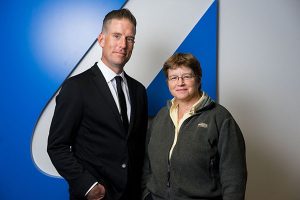
Photo: James Tensuan
Anthropology Assistant Professor AJ Faas and Social Work Assistant Professor Nicole Dubus received the 2016-17 Emeritus and Retired Faculty Association Faculty Research and Creative Activity Awards. Applications for 2017-18 are due Dec. 6.
By David Goll
Research by San Jose State University professors into how societies and nations respond to and cope with manmade and environmental disasters – and what happens to individuals when they flee due to war, political instability or climate change – received support from the Emeritus and Retired Faculty Association (ERFA) in 2016-17.
The association of former professors is now welcoming applications for the SJSU ERFA Faculty Research and Creative Activity Award, due December 6. The two grants of up to $2,500 per person are awarded to tenured faculty, tenure-track faculty or lecturers with more than six years of continuous service to San Jose State.
“Four years ago, we had some additional money,” said Joan Merdinger, member of ERFA, which includes more than 300 former SJSU faculty members. “In the past, we made donations to the library, to faculty, to the deans to use in a discretionary fashion. We wanted to do something ongoing, to honor the mission of service to the university.”
Merdinger, who retired from SJSU after a 26-year career as a professor in the School of Social Work and a stint as Associate Vice President for Faculty Affairs, said the modest grants can help faculty members attend important conferences, or help secure the assistance of graduate students in conducting research.
The resulting awards program has benefitted six current faculty members to date, including the most recent recipients: Dr. Nicole Dubus, assistant professor in the School of Social Work, in the College of Applied Sciences and Arts; and Dr. AJ Faas, assistant professor in the Department of Anthropology, in the College of Social Science.
Dubus conducts research into a compelling global issue: how public agencies can cope with the worldwide epidemic of forcibly displaced people, who number 65.6 million, according to the United Nations Refugee Agency. Examining how other countries, primarily in Europe, are dealing with waves of humans fleeing war, repression and political upheaval in Africa, the Middle East and other regions, Dubus said she hopes to bring some of the strategies being employed overseas to local communities and possibly incorporate them into the curriculum at SJSU.
In July, Dubus traveled to Malta, a tiny island nation in the Mediterranean Sea with 383,000 residents situated between North Africa and Italy. It has received thousands of forced migrants and asylum seekers in the past 15 years. While there, she studied the various stages of processing and assimilation of migrants and refugees from African and Middle Eastern countries who land in this first foothold of Europe, including how they gain access to healthcare and other public services.
Dubus met with Carmel Cefai, associate professor in the University of Malta’s Department of Psychology, director of the Centre for Resilience and Socio-Economic Health and a leading advocate for the concept of social and emotional resiliency among children, teenagers and young adults – including migrants trying to make successful transitions to a new society.
She would like to see that resiliency concept adopted locally as San Jose and other Bay Area cities struggle to assimilate adults and children fleeing dire social, political and economic circumstances. Dubus said she has also conducted research into how migrants and refugees are treated in Iceland, Germany and Sweden, having received grants from the National Science Foundation.
“I was able to spend two weeks in Malta and had a fantastic experience. I would not have been able to make the trip had it not been for the (ERFA) grant,” she said.
The $2,500 grant also proved instrumental for Faas to visit Bogota, Colombia this past June. Faas has been a member of the San Jose State faculty since 2014. He was invited to attend a meeting of 14 anthropologists, mostly from Latin America, by Virginia Garcia-Acosta, a prominent Mexican historian and social anthropologist. The group is collaborating on a book detailing the anthropological history of disasters throughout Latin America, including such watershed events as the 1985 Mexico City earthquake that killed 10,000 people, injured 30,000 and left thousands more homeless.
Faas’s academic research specialty is focused a bit further south in Ecuador, a nation of 12.5 million located along the west coast of South America. It provides no shortage of research opportunities for Faas, who began visiting the country regularly in 2009. His research includes an ongoing study of recovery and resettlement of Ecuadorean highlands residents as a result of volcanic activity.
“This is a country with 30 (mainland) volcanoes and close proximity to El Nino,” he said, referring to the meteorological phenomenon known officially as the El Nino Southern Oscillation that periodically develops in the Pacific Ocean and can lead to tremendous volumes of rain falling in some parts of the Americas.
He said that along with the disasters, Ecuadoreans have also had to cope with tremendous social and political upheaval, including adapting to 10 different presidents during a 14-year stretch between 1991 and 2005.
During his South American visit this past summer, Faas, also a member of the worldwide Culture and Disasters Action Network, said he was able to interview a number of Andean scholars for his research.
ERFA’s Merdinger said, as in past years, applications from the next group of grant proposals will be reviewed by members of the organization’s board of directors. For more information about the grant program, see application online.